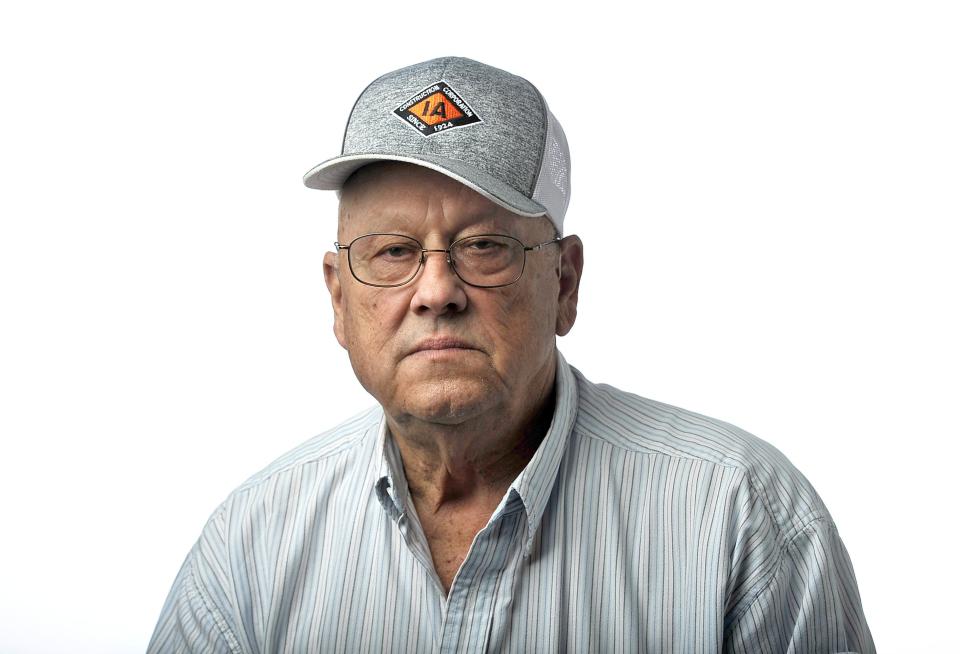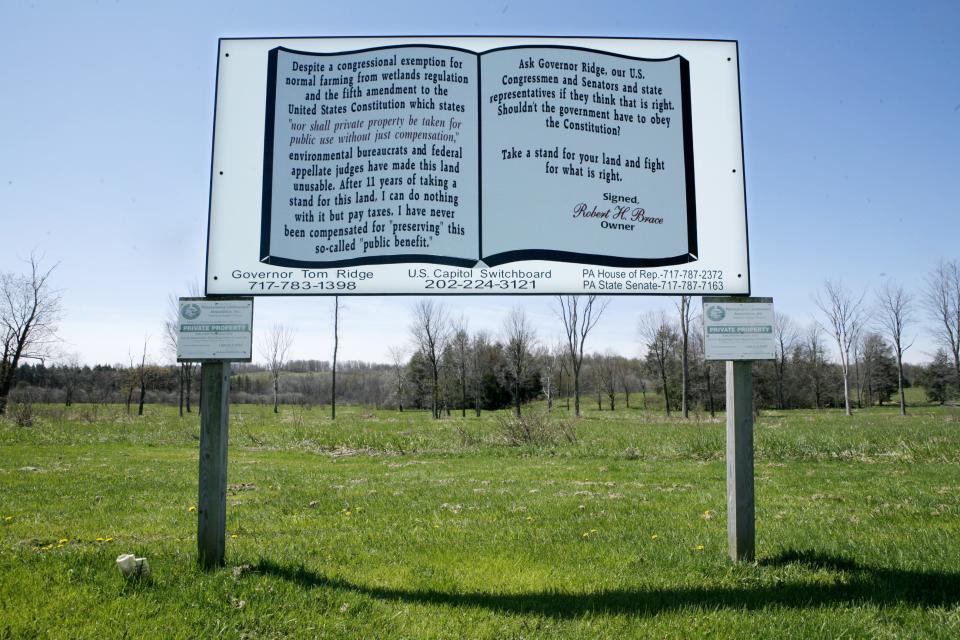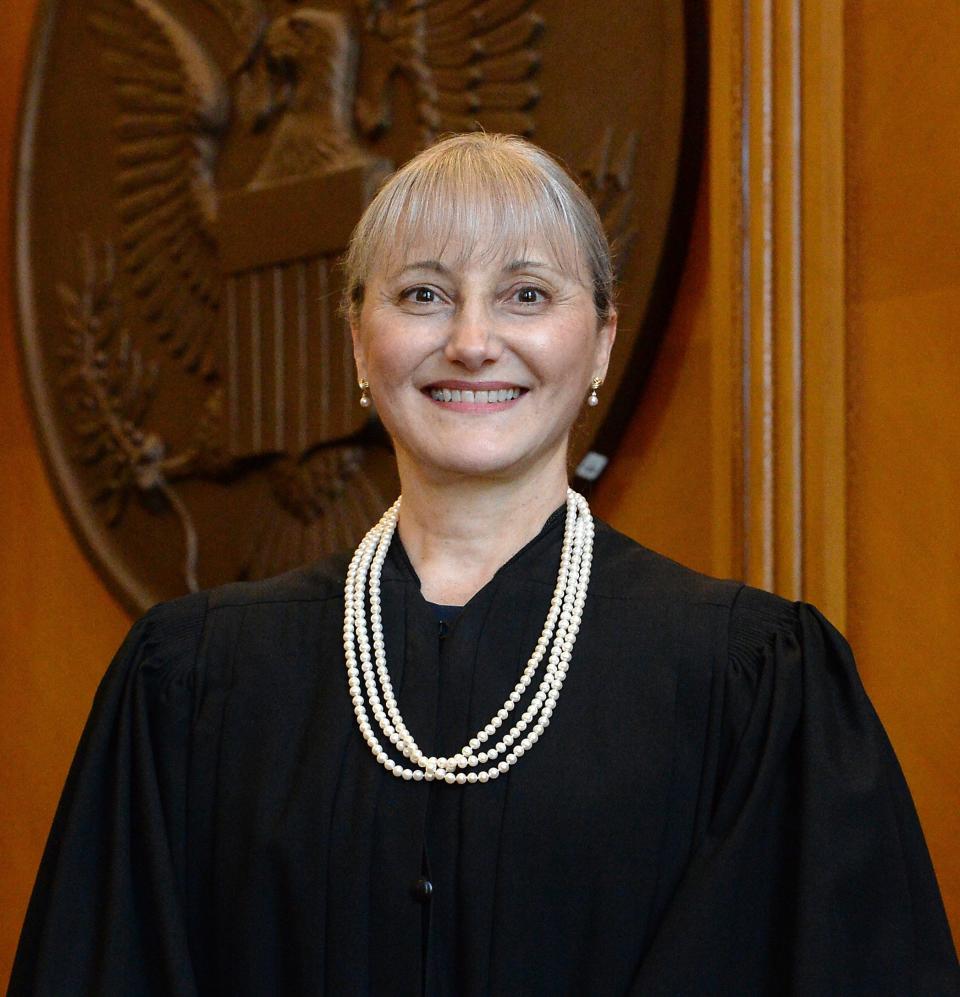Wetlands cases against Waterford farmer Bob Brace continue despite his death. Here's why
For much of his life, Waterford farmer Bob Brace fought the federal government in court over wetlands rules, gaining national attention and becoming a hero to champions of landowners' rights.
With the 84-year-old Brace's death on June 2, his survivors are left to resolve the court cases left behind.
Brace over his lifetime lost two wetlands cases in U.S. District Court in Erie. The government prevailed in its demands that Brace restore the wetlands that the courts determined he improperly cleared, plowed or farmed on his 130-acre farm near Elk Creek in southern Erie County.
Up until the time he died, Brace was working with his lawyers to come up with plans to restore the wetlands to the satisfaction of the Environmental Protection Agency and other federal agencies and end the two civil cases.
The cost is estimated to be at least $1.25 million, not including another $1.5 million in fines that a federal judge could still impose, according to court records.

The responsibility of developing the plans, paying for the repairs and resolving the cases rests with Brace's estate and its newly appointed executor, Brace's wife, Beverly, according to new court filings.
Despite Brace's death, "the United States' claims are not extinguished," according to the filings, docketed on Thursday.
Brace once said he had spent "millions and millions" of dollars in fighting the government over the wetlands since the 1990s. That estimate excluded the cost of the restoring the wetlands.
Government still pushing for plans to restore wetlands
The two filings are nearly identical and pertain to each of the two wetlands cases. Lawyers with the U.S. Department of Justice's Environment and Natural Resources Division filed them.
The documents state the government and Brace's lawyers agreed that Beverly Brace, as the executor of her husband's estate, should be substituted as a defendant in the cases to replace her husband. Beverly Brace was named executor of the estate on June 28, according to records at the Erie County Register of Wills office.
With Beverly Brace in place as the new defendant in both cases, the parties can move ahead to develop plans to "restore the impacted waters of the United States," according to the July 6 filing in one of the cases.
Brace's first wetlands case started 33 years ago
The older case against Bob Brace dates to 1990. Its started when the federal government sued, claiming Brace violated the Clean Water Act over wetlands.
The legal battle turned into one of the best-known property rights cases in the nation and led to the formation of the Pennsylvania Landowner's Association.
Brace in that case clashed with the U.S. Fish and Wildlife Service about his right to repair drainage pipes on a section of his farm. The federal judge who first heard the case, Glenn Mencer, ruled in Brace's favor in 1993, finding that Brace had done nothing but follow normal and accepted farming practices.

The 3rd U.S. Circuit Court of Appeals, based in Philadelphia, reversed Mencer's decision and ruled in favor of the government. The Supreme Court declined to hear the case in 1995, letting the 3rd Circuit's decision stand.
After the 3rd Circuit ruling, Brace signed a consent decree, entered in 1996, in which he agreed not to disturb certain wetlands on his farm, where he grew corn and soybeans. The consent decree included a wetlands restoration plan.
The case restarted with in litigation in 2016. The EPA filed notices of violations against Brace, claiming he ran afoul of the 1996 consent decree by, among other things, clearing, draining, plowing and planting on 30 acres of wetlands that the decree and restoration plan were designed to protect. The 30-acre parcel of his farmland, a U-shaped section called the Murphy Farm, is near Lane Road in Waterford Township.
Brace fought the notice of violations, but lost before U.S. District Judge Susan Paradise Baxter in 2021. In an 86-page opinion, she found the EPA's notice of violations against Brace was valid, and that he had waited too long to ask the courts to set aside the consent decree — an agreement between two parties that includes judicial oversight.
Though she ruled against Brace, Baxter held off on deciding whether to grant the government's request that she penalize him as much as $1,562,250 under the terms of the consent decree.

Baxter wrote that she would defer a decision on the penalties and costs pending the development of a plan between the government and Brace on how Brace will restore the wetlands that were subject of the violations. That plan is still under development.
In response to Baxter's decision, Brace told the Erie Times-News in 2021 that "environmental law is the same as Sharia law," referring to Islam's legal system. He appealed.
The 3rd Circuit ruled against Brace in January. A three-judge panel unanimously ruled that Baxter was correct in finding that the restoration plan "unambiguously prohibited" Brace's activities, such as excavating a ditch. Baxter "properly determined" that Brace "violated the plan and, in turn, the consent decree," according to the ruling.
Brace's second wetlands case went to court in 6 years ago
In the second wetlands case, the federal government sued Brace in 2017, claiming that he violated environmental regulations by clearing other wetlands without a permit in 2012. Brace challenged the government, but another federal judge, Barbara A. Rothstein, rejected Brace's claims in 2019.
The ruling in that case concerned 20 acres, known as the Marsh Farm, located in McKean and Waterford townships, immediately east of Sharp Road, north of Lane Road and south of Greenlee Road.
The 3rd Circuit in June unanimously affirmed Rothstein's ruling in 2020. A three-judge panel backed her unusual finding that Brace's previous lawyer, from New York City, had handled the case so poorly that the government prevailed by default.
Since the appellate court rulings in both cases, Brace's lawyers have been working with engineering firms and other professionals to develop restoration plans for the wetlands, according to court records.
In the 2017 case, Brace's lawyers reported in December "that a quote to implement the plan" over those wetlands "had exceeded $1.25 million," according to one of the government's filing on Thursday. The Justice Department lawyers are waiting on more information "to assess the validity of that estimate," according to the filing.
In the 1990 case, Brace's lawyers continued to work with the EPA to develop a restoration plan for those wetlands, according to the most recent status report Brace's lawyers filed in that case. The lawyers, Neal Devlin and Alexander Cox, of Erie, could not be immediately reached for comment.
Will a new Supreme Court decision affect the Brace cases?
Brace for decades challenged environmental law as too restrictive, and he most likely would have applauded a ruling the Supreme Court made on May 25. The ruling came down two months after Brace suffered serious injuries in an automobile accident, on March 27, and about a week before his death.
The Supreme Court ruled in a case that originated in Idaho. A 5-4 majority significantly expanded the ability of farmers, homebuilders and other developers to dig up or fill wetlands near rivers, lakes and streams, finding the government had long overreached in limiting such activities, according to the Associated Press.
Major ruling: 'Significant repercussions.' Supreme Court limits government power to curb water pollution
The ruling would not appear to affect Brace's 1990 case, because the dispute in that litigation centered on a consent decree. But whether the ruling affects the ongoing litigation in the more recent case remains uncertain. Brace's lawyers could try to cite the Supreme Court decision in their favor as they seek to resolve that case.
Contact Ed Palattella at epalattella@timesnews.com. Follow him on Twitter @ETNpalattella.
This article originally appeared on Erie Times-News: Waterford farmer Bob Brace died in June, but his wetlands cases go on

